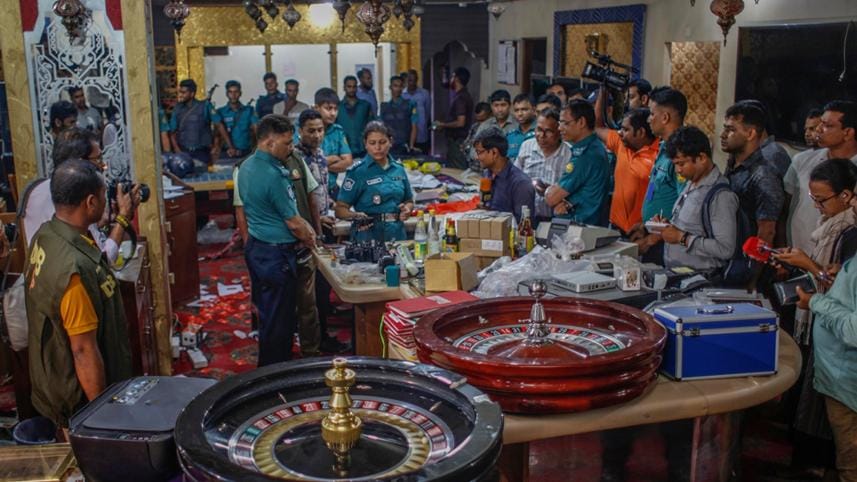Unveiling the limits of anti-corruption drive

Media interest on the recently launched high-profile anti-corruption drive appears to be on the wane thanks to many competing issues. The drive against a few ruling party affiliated student and youth leaders, some procurement lords and kingpins of casinos is in some ways unprecedented and has raised wide public interest and many expectations. The booties of illegality around casinos, public procurement and other instances of abuse of politically linked power are scandalous, though not surprising at all. The way corruption and its impunity have been allowed to be institutionalised, this was inevitable.
What has so far been exposed are just the tip of the iceberg, at best symptoms of a much deeper and multi-layered disease caused by a long-nourished feature of Bangladesh's political culture, e.g., possession of power or status through direct, indirect or even manipulated political links is a mandate to abuse power for private gain and personal enrichment. This mandate has been treated as normal, unrestricted and all-embracing. Over the years, it has been blessed, protected and promoted by beneficiaries among power-holders and duty-bearers in political, business, administrative, law enforcement and indeed the whole of institutional space of the state.
Against this backdrop the head of the government and leader of the ruling party made three highly meaningful pledges: a) zero tolerance against corruption; b) nobody will be spared; and c) cleanse own house first. What has happened so far may be broadly viewed somewhat consistent with this framework. The main challenge, however, lies in enforcing these without fear or favour. The extent to which it will be truly implemented depends on the capacity and commitment of those who are entrusted and authorised to do so, many of whom are among beneficiaries, promoters and protectors of the institutional structure of corruption.
Take the removal of the two leaders of the ruling party's student front in Jahangirnagar University, allegedly for collecting a stunning amount of bribe in the name of Eid gift in a transaction in the presence of the vice chancellor. Nothing further has happened since the removal, nor is there any indication whether or not the removed as well as other actors in the supply chain of the deal would be held to account. Notably, student and youth leaders are elected and fired not by students or youth but by their political guardians. Not many vice chancellors of public universities are appointed without political connections either.
Independent investigation of the transaction and other reported irregularities in connection with some development projects of the university have been the main demand of the striking general students and teachers. Instead of responding to the call for accountability, the striking students were subjected to intimidation including harassment by security agencies, a standard means of suppressing dissension.
That the casino business flourished in Dhaka could be no surprise for those who were authorised to enforce the law against this illegality. It is no petty crime that escaped police and other relevant authority's attention by chance. It thrived just before the eyes of the law enforcement agencies, administration, political leaders and public representatives of various levels. Imported equipment and illegally employed foreign staff formed the backbone of the lavish facilities which also raise concerns about accountability of officials of quite a few other government departments.
Question remains whether such stakeholders of corruption will be brought to justice consistent with the pledge of zero tolerance and no one to be spared. The same is true for actors in the network of corruption in public procurement, which has been exposed as the source of filthy enrichment by some of those under investigation, facilitated by a win-win game involving collusion and protection by the proverbial big fish.
Another dimension of abuse of politically linked power is the accumulated brutality in student politics manifested by the killing of the BUET student Abrar Fahad, which exposed the brute face of intolerance of the constitutionally mandated exercise of freedom of expression. Remedy to the problem was found in banning student politics which the BUET authority resorted to. But the ban, if anything, is unlikely to be anything more that chopping off the head to cure headache. The right of non-partisan general students to free speech appears to have become the easy scapegoat. The ban may indeed be conveniently used to deny the students the right to independent views, exactly the cause for which Abrar had to pay by life. On the other hand, there is no indication yet that the proper lesson has been taken—delink student and youth politics from mainstream politics, criminalisation of a section of which is the role model for student fronts in their own way.
Delivery of the Prime Minister's pledge of putting own house in order needs a paradigm shift in values, norms and practices in political parties for retransforming themselves into genuine political institutions, as disruptive and implausible as it may appear in the abiding context. The same is true for nearly every other relevant institution of the state, rendered almost dysfunctional mainly by partisan influence. Therefore, it is hard to expect the much-hyped anti-corruption drive to be a magic bullet, nor will it be surprising if it remains limited to only a few spent forces and at best prove to be palliatives for some selected syndromes while the deeper and structural problem stays on.
Iftekharuzzaman is Executive Director, Transparency International Bangladesh.




 For all latest news, follow The Daily Star's Google News channel.
For all latest news, follow The Daily Star's Google News channel.
Comments